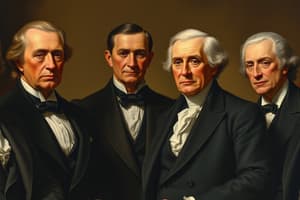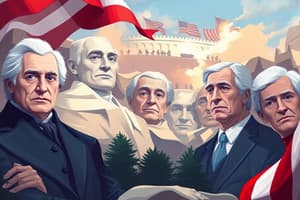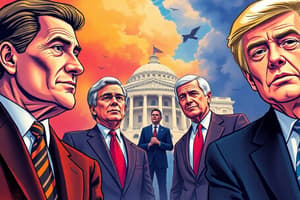Podcast
Questions and Answers
Which amendment repealed the prohibition of alcohol?
Which amendment repealed the prohibition of alcohol?
- Amendment 19
- Amendment 20
- Amendment 18
- Amendment 21 (correct)
What was a primary reason for the establishment of the 20th Amendment?
What was a primary reason for the establishment of the 20th Amendment?
- To allow for women's suffrage
- To enforce prohibition
- To regulate political campaigns
- To establish the president's term end date (correct)
What was one major consequence of World War II in relation to imperialism?
What was one major consequence of World War II in relation to imperialism?
- Caused further colonization in Asia
- Increased immigration to the U.S.
- Led to post-war decolonization (correct)
- Strengthened colonial powers
Which of the following best describes direct democracy?
Which of the following best describes direct democracy?
What role did Truman play during World War II?
What role did Truman play during World War II?
What ideology is described as prioritizing one's native culture over others?
What ideology is described as prioritizing one's native culture over others?
What was Father Coughlin known for?
What was Father Coughlin known for?
Who was the first Jewish Supreme Court judge in the U.S.?
Who was the first Jewish Supreme Court judge in the U.S.?
What was a significant contributing factor to the Allies' victory in World War II?
What was a significant contributing factor to the Allies' victory in World War II?
Which location did British forces pass through to advance during World War II?
Which location did British forces pass through to advance during World War II?
What was a tactic used by the Russians called when Germany invaded during World War II?
What was a tactic used by the Russians called when Germany invaded during World War II?
What event is known as the turning point of World War II?
What event is known as the turning point of World War II?
Which country used Zyklon B as part of the Final Solution during the Holocaust?
Which country used Zyklon B as part of the Final Solution during the Holocaust?
What was the goal of propaganda used by both the Allies and Axis powers during the war?
What was the goal of propaganda used by both the Allies and Axis powers during the war?
What was one of the outcomes of the Bataan Death March during World War II?
What was one of the outcomes of the Bataan Death March during World War II?
How did the Japanese perception of their emperor impact the U.S. military strategy during World War II?
How did the Japanese perception of their emperor impact the U.S. military strategy during World War II?
What was the significance of Woodrow Wilson's 14 points?
What was the significance of Woodrow Wilson's 14 points?
Which scandal is associated with Warren Harding's presidency?
Which scandal is associated with Warren Harding's presidency?
What was Calvin Coolidge's primary focus during his presidency?
What was Calvin Coolidge's primary focus during his presidency?
What was Herbert Hoover's background prior to becoming president?
What was Herbert Hoover's background prior to becoming president?
What famous phrase is associated with Franklin Roosevelt's approach during the Great Depression?
What famous phrase is associated with Franklin Roosevelt's approach during the Great Depression?
What condition did Franklin Roosevelt suffer from that impacted his presidency?
What condition did Franklin Roosevelt suffer from that impacted his presidency?
How did Harry Truman achieve his goals despite having poor eyesight?
How did Harry Truman achieve his goals despite having poor eyesight?
What statement best reflects Theodore Roosevelt's view on fear?
What statement best reflects Theodore Roosevelt's view on fear?
What was a significant characteristic of the Jazz Age?
What was a significant characteristic of the Jazz Age?
What defined the Lost Generation after World War I?
What defined the Lost Generation after World War I?
What was the primary motivation behind the Immigration Act of 1924?
What was the primary motivation behind the Immigration Act of 1924?
What was the main consequence of the trial of Sacco and Vanzetti?
What was the main consequence of the trial of Sacco and Vanzetti?
What type of social movement was the Harlem Renaissance?
What type of social movement was the Harlem Renaissance?
What did the Iron Curtain represent during the Cold War?
What did the Iron Curtain represent during the Cold War?
What was the purpose of Truman's Loyalty Act?
What was the purpose of Truman's Loyalty Act?
What triggered the Red Summer riots in 1919?
What triggered the Red Summer riots in 1919?
What was the purpose of the Palmer Raids?
What was the purpose of the Palmer Raids?
What role did Joseph McCarthy play during the Red Scare?
What role did Joseph McCarthy play during the Red Scare?
Who were Ethel and Julius Rosenberg?
Who were Ethel and Julius Rosenberg?
What societal change did Progressivism advocate for?
What societal change did Progressivism advocate for?
What characterized the McCarthy Trials?
What characterized the McCarthy Trials?
What does nativism primarily support?
What does nativism primarily support?
What kind of sentiment did anti-Russian sentiment reflect in the United States during the Cold War?
What kind of sentiment did anti-Russian sentiment reflect in the United States during the Cold War?
What consequence did the fear of communism have on various U.S. sectors?
What consequence did the fear of communism have on various U.S. sectors?
What was the primary reason for the limited job opportunities for Black individuals during the New Deal?
What was the primary reason for the limited job opportunities for Black individuals during the New Deal?
Which of the following statements about the Black Eagles during World War II is true?
Which of the following statements about the Black Eagles during World War II is true?
What was a significant consequence of the incident during the Red Summer?
What was a significant consequence of the incident during the Red Summer?
What was one of the main reasons for the Great Migration of Black individuals in the early 20th century?
What was one of the main reasons for the Great Migration of Black individuals in the early 20th century?
What impact did Truman's desegregation order have on the military during the Korean War?
What impact did Truman's desegregation order have on the military during the Korean War?
How did the roles of women change during World War II compared to the previous decades?
How did the roles of women change during World War II compared to the previous decades?
Which factor contributed to the increased visibility and freedom for women during the Roaring Twenties?
Which factor contributed to the increased visibility and freedom for women during the Roaring Twenties?
What societal expectation persisted for women during the Great Depression despite their need to work?
What societal expectation persisted for women during the Great Depression despite their need to work?
Flashcards
Direct Democracy
Direct Democracy
A political system where citizens directly vote on laws and policies.
Representative Democracy
Representative Democracy
A political system where citizens elect representatives to make decisions and laws on their behalf.
Communism
Communism
A political ideology advocating for the abolition of private property and the establishment of a classless society where resources are shared equally.
Nativism
Nativism
Signup and view all the flashcards
Demagogue
Demagogue
Signup and view all the flashcards
Prohibition (18th Amendment)
Prohibition (18th Amendment)
Signup and view all the flashcards
Repeal of Prohibition (21st Amendment)
Repeal of Prohibition (21st Amendment)
Signup and view all the flashcards
Women's Suffrage (19th Amendment)
Women's Suffrage (19th Amendment)
Signup and view all the flashcards
Woodrow Wilson
Woodrow Wilson
Signup and view all the flashcards
Warren G. Harding
Warren G. Harding
Signup and view all the flashcards
Calvin Coolidge
Calvin Coolidge
Signup and view all the flashcards
Herbert Hoover
Herbert Hoover
Signup and view all the flashcards
Franklin D. Roosevelt
Franklin D. Roosevelt
Signup and view all the flashcards
The New Deal
The New Deal
Signup and view all the flashcards
Harry S. Truman
Harry S. Truman
Signup and view all the flashcards
Franklin D. Roosevelt
Franklin D. Roosevelt
Signup and view all the flashcards
Red Scare
Red Scare
Signup and view all the flashcards
Iron Curtain
Iron Curtain
Signup and view all the flashcards
McCarthyism
McCarthyism
Signup and view all the flashcards
Anti-Russian Sentiment
Anti-Russian Sentiment
Signup and view all the flashcards
Alger Hiss Case
Alger Hiss Case
Signup and view all the flashcards
Rosenberg Trial
Rosenberg Trial
Signup and view all the flashcards
Hollywood 10
Hollywood 10
Signup and view all the flashcards
Jazz Age
Jazz Age
Signup and view all the flashcards
Lost Generation
Lost Generation
Signup and view all the flashcards
Palmer Raids
Palmer Raids
Signup and view all the flashcards
Strikes
Strikes
Signup and view all the flashcards
Red Summer
Red Summer
Signup and view all the flashcards
Johnson-Reed Act
Johnson-Reed Act
Signup and view all the flashcards
Black Eagles
Black Eagles
Signup and view all the flashcards
The Great Migration
The Great Migration
Signup and view all the flashcards
The New Deal and Black Americans
The New Deal and Black Americans
Signup and view all the flashcards
Racial Integration in the Korean War
Racial Integration in the Korean War
Signup and view all the flashcards
Women's Roles in the 1920s
Women's Roles in the 1920s
Signup and view all the flashcards
Women's Roles in the 1930s
Women's Roles in the 1930s
Signup and view all the flashcards
Women's Roles in the 1940s
Women's Roles in the 1940s
Signup and view all the flashcards
Who were the Axis Powers?
Who were the Axis Powers?
Signup and view all the flashcards
What were the Allies' strengths?
What were the Allies' strengths?
Signup and view all the flashcards
What was the significance of the Battle of Stalingrad?
What was the significance of the Battle of Stalingrad?
Signup and view all the flashcards
What was Scorched Earth Welfare?
What was Scorched Earth Welfare?
Signup and view all the flashcards
How did propaganda play a role in WWII?
How did propaganda play a role in WWII?
Signup and view all the flashcards
What were the Nuremberg Laws?
What were the Nuremberg Laws?
Signup and view all the flashcards
How did Japanese loyalty impact the war in Asia?
How did Japanese loyalty impact the war in Asia?
Signup and view all the flashcards
What was the island hopping strategy?
What was the island hopping strategy?
Signup and view all the flashcards
Study Notes
Woodrow Wilson
- President during World War I
- Created the Fourteen Points
- Experienced health issues during his presidency, including slurred speech and illness.
Warren Harding
- Handsome president, popular with women
- Controversial presidency due to corruption
- His wife actively sought to influence his political career
- Involved in the Teapot Dome Scandal, a bribery scandal concerning the leasing of government oil reserves.
- Held the Washington Naval Conference, aiming for peace among naval powers.
- Died in office.
Calvin Coolidge
- Harding's Vice President, assumed presidency after Harding's death
- Restored dignity and integrity to the White House
- Focused on business and economic prosperity
- Believed "the business of America is business"
- Reduced taxes for wealthy Americans
Herbert Hoover
- President during the start of the Great Depression
- Promised to end poverty
- Advocate for humanitarian causes, particularly helping orphans
- Self-made billionaire and engineer
Franklin D. Roosevelt
- President during the Great Depression
- Introduced the New Deal initiatives to combat the economic crisis
- "The only thing we have to fear is fear itself"
- Effective communicator, using radio broadcasts (fireside chats) to connect with the public
- Democrat, wealthy, naval officer, and governor of New York.
Prohibition (Amendment 18 & 21)
- Amendment 18 prohibited alcohol.
- Amendment 21 repealed the 18th Amendment due to widespread violence and a desire to tax alcohol to fund the Great Depression.
Suffrage (Amendment 19)
- Granted women the right to vote.
Imperialism and Colonialism (WWI & WWII)
- European powers used colonies for resources, soldiers, and strategic purposes during both world wars.
- Post-war, German and Ottoman territories were under mandates.
- Imperialistic ambitions played a part in the events of both world wars.
Democracy (Direct and Representative)
- Direct democracy involves citizens directly making decisions
- Representative democracy involves electing officials to make decisions on behalf of citizens
Communism
- A political ideology advocating for a classless society with shared ownership of resources
Nativism
- Ideology prioritizing native-born citizens over immigrants.
Jazz Age
- Period characterized by booming nightlife, flapper culture, and artistic expression.
Red Scare (1 & 2)
- Period of intense fear of communism within the US
- Increased during the Cold War.
- US government attempted to find and remove perceived communist threats.
Technological Advancements of WWII
- Development of technologies for use in war (e.g., radar, computers, and medicine) that had later use in civilian areas
World War 2 Legislation
- Marshall plan – rebuilding western European countries after World War 2.
- United Nations – preventing wars in the future.
- Creation of International organizations to mitigate war
- Actions taken to curb communist influence.
Mexican Repatriation
- Forced removal of Mexicans across the US border in response to economic hardship.
Asian Americans and Internment
- Japanese-Americans were placed in internment camps during World War II.
New Deal
- Programs and initiatives created by Roosevelt aimed at stabilizing the economy and reducing the impact of the Great Depression.
- Includes a number of economic and financial reforms.
Cold War, Berlin Blockade
- Period of geopolitical tension between the US and the Soviet Union
- The Soviet Union Blockade of West Berlin was a significant event during the Cold War.
Studying That Suits You
Use AI to generate personalized quizzes and flashcards to suit your learning preferences.




